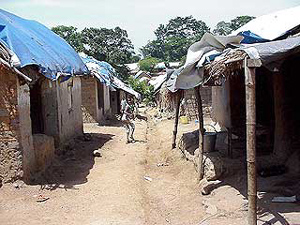Refugee camp
Refugee camps are temporary facilities set up to provide immediate protection and assistance to people who have been forced to flee their homes due to conflict, persecution, or natural disasters. These camps offer essential services such as shelter, food, water, and medical care to refugees and sometimes to internally displaced persons (IDPs). The primary goal of refugee camps is to provide a safe and secure environment for their inhabitants until they can return home, integrate into the host country, or resettle in a third country.
Overview[edit | edit source]
Refugee camps are often established in response to an emergency situation, where the speed of setup and the ability to provide immediate aid are crucial. They are usually located near the border of the country from which the refugees have fled, facilitating potential repatriation. The United Nations High Commissioner for Refugees (UNHCR), along with host governments and various non-governmental organizations (NGOs), are typically involved in the establishment and management of these camps.
Living Conditions[edit | edit source]
Living conditions in refugee camps can vary widely, but many face challenges such as overcrowding, inadequate shelter, limited access to clean water and sanitation facilities, and insufficient food supplies. Health issues, including outbreaks of communicable diseases, are also common due to the high population density and poor living conditions. Education and employment opportunities are often limited, affecting the long-term wellbeing and self-sufficiency of camp residents.
Services Provided[edit | edit source]
Shelter[edit | edit source]
Shelters in refugee camps are often made from materials such as plastic sheeting, canvas, or local materials. These structures are usually intended to be temporary but can become semi-permanent homes for refugees due to protracted conflicts.
Food and Water[edit | edit source]
Humanitarian organizations provide food rations and clean water to prevent malnutrition and waterborne diseases. However, the adequacy of these supplies can vary depending on funding and logistical challenges.
Medical Care[edit | edit source]
Refugee camps have health care facilities to address basic health needs and emergencies. Vaccination programs, maternal care, and treatment for common illnesses are typically available.
Education[edit | edit source]
Efforts are made to provide education for children in refugee camps, but resources are often limited. Makeshift schools and informal education programs are common.
Challenges[edit | edit source]
Refugee camps face numerous challenges, including security issues, funding shortfalls, and the complex logistics of providing aid in remote or conflict-affected areas. The dependence on international aid can also lead to a lack of self-sufficiency for camp residents. Moreover, the temporary nature of camps can become protracted, with some camps existing for decades and generations of refugees growing up in these settings.
Future Prospects[edit | edit source]
The future of refugee camps involves finding durable solutions for their inhabitants, including voluntary repatriation to their home country, local integration into the host country, or resettlement in a third country. However, political, security, and economic obstacles often complicate these solutions.
| This article is a stub. You can help WikiMD by registering to expand it. |
Search WikiMD
Ad.Tired of being Overweight? Try W8MD's physician weight loss program.
Semaglutide (Ozempic / Wegovy and Tirzepatide (Mounjaro / Zepbound) available.
Advertise on WikiMD
|
WikiMD's Wellness Encyclopedia |
| Let Food Be Thy Medicine Medicine Thy Food - Hippocrates |
Translate this page: - East Asian
中文,
日本,
한국어,
South Asian
हिन्दी,
தமிழ்,
తెలుగు,
Urdu,
ಕನ್ನಡ,
Southeast Asian
Indonesian,
Vietnamese,
Thai,
မြန်မာဘာသာ,
বাংলা
European
español,
Deutsch,
français,
Greek,
português do Brasil,
polski,
română,
русский,
Nederlands,
norsk,
svenska,
suomi,
Italian
Middle Eastern & African
عربى,
Turkish,
Persian,
Hebrew,
Afrikaans,
isiZulu,
Kiswahili,
Other
Bulgarian,
Hungarian,
Czech,
Swedish,
മലയാളം,
मराठी,
ਪੰਜਾਬੀ,
ગુજરાતી,
Portuguese,
Ukrainian
Medical Disclaimer: WikiMD is not a substitute for professional medical advice. The information on WikiMD is provided as an information resource only, may be incorrect, outdated or misleading, and is not to be used or relied on for any diagnostic or treatment purposes. Please consult your health care provider before making any healthcare decisions or for guidance about a specific medical condition. WikiMD expressly disclaims responsibility, and shall have no liability, for any damages, loss, injury, or liability whatsoever suffered as a result of your reliance on the information contained in this site. By visiting this site you agree to the foregoing terms and conditions, which may from time to time be changed or supplemented by WikiMD. If you do not agree to the foregoing terms and conditions, you should not enter or use this site. See full disclaimer.
Credits:Most images are courtesy of Wikimedia commons, and templates Wikipedia, licensed under CC BY SA or similar.
Contributors: Prab R. Tumpati, MD






